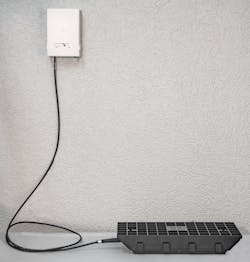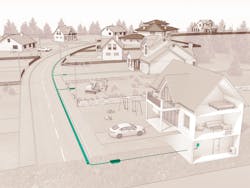Today, working from home is a relatively new experience for many workers who are working remotely. Over 55% say they rarely or never worked from home prior to the coronavirus outbreak. For those who have made the switch to telework since COVID-19, many say their work lives have changed in significant ways, according to Pew Research. Most (64%) of those who are now working from home at least some of the time (but rarely or never did before the pandemic) say it’s easier to balance work with their personal life. And many (44%) say working from home has made it easier for them to get their work done and meet deadlines. More than 72% say working from home hasn’t affected their ability to advance in their job.1
What’s more, online streaming services like Netflix and Prime Video, alongside online gaming, and video applications, generate a huge amount of data usage. This demand will continue to grow over the next few years, with 4K, 3D, Virtual Reality, Ultra-High-Definition (UHD) television, Augmented Reality and smart home technology becoming increasingly prevalent.
The result? End-users are demanding fiber technologies right now and their fiber cravings will escalate in the future. Point Topic recently forecasted that by the end 0f 2030, some “variant of fiber” (FTTH/P/B) will be used by 75% of fixed broadband subscribers globally, compared to 62% in Q4 2021. The research company expects fiber to be used by more than half of all global households, while overall fixed broadband penetration will be 70%.2 (See Figure 1.)
The trick is how to make fiber easier to install. In the past, FTTH installations required coordination of different teams to bury and physically connect the fiber drop to the home. Technicians then tested and turned up services to each and every end user. Clearly, that was costly and did not scale.
German Innovation
According to a report by the FTTH council in September 2021, only 22.1% of German households have access to fiber. And only about 27% of German consumers are taking advantage of a fiber subscription. That’s quite low compared to other economies like Spain and Sweden whose fiber availability is higher than 75%.3
The country is attempting to catch up and take advantage of FTTH technology, with the Government outlining ambitious rollout goals. But deploying FTTH does not come without challenges, especially in rural/suburban areas. Historically, one major stumbling block stemmed from the final connection to a consumer’s home, known as “the last mile”. Even after placing fiber underground, the street installation and fiber connection to the property require planning permissions from local authorities well before technicians come to the home to connect the final drop.
This led a German operator to look for a bespoke fiber-optic solution that addressed the last-mile challenge in countryside areas. The objective was to reduce the cost and time of its FTTH deployment initiatives to blanket the whole of Germany with fiber over the next three years.
“End-users are demanding fiber technologies right now and their fiber cravings will escalate in the future. Point Topic recently forecasted that by the end 0f 2030, some ‘variant of fiber’ (FTTH/P/B) will be used by 75% of fixed broadband subscribers globally, compared to 62% in Q4 2021.”
It turned to HUBER+SUHNER which created the RESA (Residential Access) solution—the first on the market to enable subscribers to part-install their own fiber as a DIY-style installation.
The operator wanted a modular connectivity solution designed for use in both rural and suburban residential areas. The “ask” was to have the solution split into two phases—homes passed and homes connected. For the first phase, homes passed, a Splice Closure (RESA SC) box would be buried by the operator at the entrance of each property at a depth of 0.5–1 meter in the ground. To complete the second phase, a pre-connectorized Building Entry Point module and pre-terminated mini cable would be sent with simple instructions to the property owners who have chosen to subscribe to FTTH access. They can now organize garden workers to build the proper trench and the wall through entry and install the cable set or even do the complete job themselves. (See Figures 2 and 3.)
By enabling subscribers to install the final stage of the solution, the operator aimed to cut down the time and resources required to coordinate FTTH upgrades to each household, eliminating the need for a truck roll to each individual property.
This was especially beneficial during the pandemic when social distancing requirements were in place. The RESA4 product was developed by HUBER+SUHNER helping those installation teams concentrating on the German fiber rollout to reduce time and resources. It’s also empowered homeowners to take charge of upgrading their broadband speeds and hopping off extensive waiting lists for FTTH installation.
In order to realize a fiber future for the rest of the globe, solutions like this can help revolutionise the way carriers complete these rollouts, making the overall process smoother and more cost-effective for all involved.
REFERENCES AND NOTES
1. https://www.pewresearch.org/social-trends/2022/02/16/covid-19-pandemic-continues-to-reshape-work-in-america/
2. https://www.point-topic.com/post/global-fixed-broadband-2030
3. https://www.ftthcouncil.eu/knowledge-centre/all-publications-and-assets/1436/european-ftth-b-market-panorama-2022
4. https://www.hubersuhner.com/en/products-en/fiber-optics/fiber-management-systems/resa
ABOUT THE AUTHOR
Daniel Berz is Market Manager for Fixed Access Network at HUBER+SUHNER. He has more than 25 years of experience in telecommunications and the industry. For more information, email [email protected] and visit https://www.hubersuhner.com/. Follow them on LinkedIn: https://www.linkedin.com/company/hubersuhner/ and Twitter: https://twitter.com/hubersuhner.
About the Author
Daniel Berz
Market Manager for Fixed Access Network, HUBER+SUHNER
Daniel Berz is Market Manager for Fixed Access Network at HUBER+SUHNER. He has more than 25 years of experience in telecommunications and the industry. For more information, email [email protected] and visit https://www.hubersuhner.com/. Follow them on LinkedIn: https://www.linkedin.com/company/hubersuhner/ and Twitter: https://twitter.com/hubersuhner.



